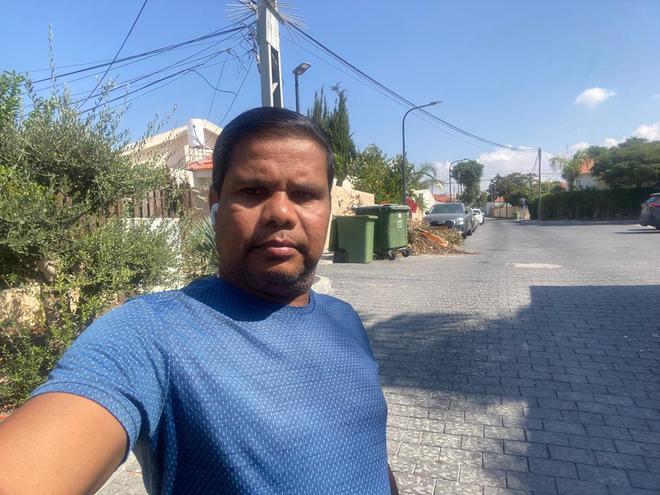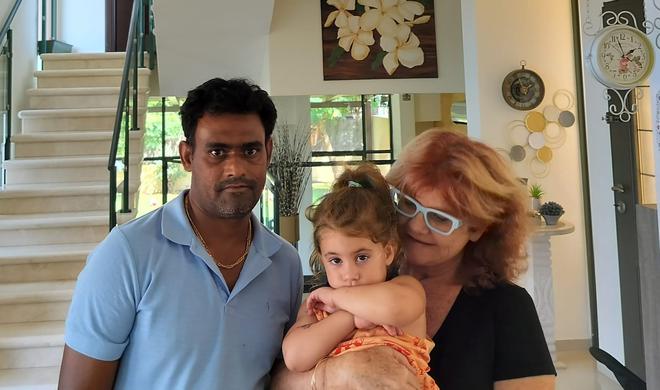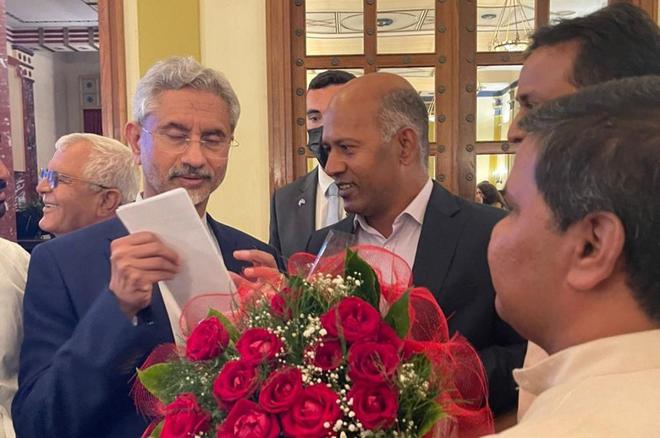“Anna (brother), I am rushing to a shelter; the siren has started blaring,” says Elle Prasad, 46, over the phone, raising his voice to make himself heard over the din in the southern Israeli city of Ashkelon bordering the Gaza Strip, where fresh armed conflict between Israel and Palestinian militant groups led by the Hamas is underway.
As he scurries to a bomb shelter, the blaring siren can be heard in the distance. He continues to narrate the live situation unfolding in trouble-torn West Asia. With the conflict raging on, residents find themselves caught in the crossfire, with hundreds killed or maimed.
For caregivers, hailing from Telangana and Andhra Pradesh, who made Israel their home, the ongoing turmoil has not only disrupted their lives but has also heightened the concerns for their families back home.
Prasad recalls travelling to Tel Aviv, a 45-minute drive from Ashkelon, to meet a group of expatriates on October 6. “I had taken permission from my employer to attend the meet-up. I heard sirens continuously wailing while preparing to return to Ashkelon the next day. There were announcements over the public address system while the television flashed the news of surprise attacks by Hamas terrorists,” he shares.

The first thing he did was to try and contact his elderly employer, a hearing-impaired man he provides care for. “He was all alone at home, and I could not get in touch with him. As I started to make the trip back, I could see thick plumes of smoke in the sky. So, I avoided the highway and took a city route to reach his house. I was relieved to see him safe, watching television,” recounts Prasad, who communicates in English now and has also picked up a few words of Hebrew.
Worry about war
Scores of Indians like him, despite limited education, have built a reputation as diligent workers, making them sought-after in the caregiving sector in Israel, next only to Sri Lankans, Nepalis, and Filipinos. Their visas are issued based on an undertaking by their employer, who sponsors them. These personal attendants, mostly men, live with the elderly who are sick or injured, taking care of their daily needs like feeding, bathing and walking with them. They get a day off every week and earn anything from ₹1.25 to 1.5 lakh a month, with additional benefits.
A majority of the Indian caregivers hail from north Telangana’s Nizamabad and Karimnagar districts. While this started as a trickle in 2003-04, there are now approximately 800 people from Telangana alone and an estimated 4,000 from Andhra Pradesh working in various parts of Israel, as per data from the Israel Telangana Association. According to the Indian Embassy website, there are nearly 18,000 Indian citizens in Israel, primarily caregivers, diamond traders, IT professionals, and students. In addition, there are around 85,000 Jews of Indian origin residing in Israel.
Prasad, who has been living in Israel for the past 15 years, is no stranger to the occasional whistling of an incoming rocket fired from the nearby Gaza Strip, about 18 km away. However, this time, it wasn’t just the missiles that kept him on the edge.
“Sneak attacks are nothing out of the ordinary, but this time, it was the fear of Hamas operatives barging into homes that kept us worried, as the news of an attack on attendees at Tribe of Nova Festival close to the Gaza Strip, spread like wildfire”Elle PrasadCaregiver from Telangana
“Sneak attacks are nothing out of the ordinary, but this time, it was the fear of Hamas operatives barging into homes that kept us worried, as the news of an attack on attendees at Tribe of Nova Festival close to the Gaza Strip, spread like wildfire,” he says, of the all-night music party to celebrate Sukkot. Approximately 260 people died in the outdoor Israeli music festival held on October 7 after the attack by Hamas militants.
Families tense
Prasad’s journey to Israel was born out of his desire to find opportunity and peace, by escaping the anxiety and suffering in his native village—Mudepalli in Chandurthy mandal of Rajanna Sircilla district in Telangana (carved out of erstwhile Karimnagar district in October 2016)—which was in the grip of Maoist movement for close to three decades. The Naxalites, then the People’s War Group, had a free run as the village was on the forest fringes.
The Naxals and the police used to frequent Mudepalli in search of each other, and the residents were caught in the middle of it all. To escape the daily suffering, Prasad discontinued his studies after Class 10 to join his father, Devaiah, in Mumbai where the latter was employed at a mill.
He began his career as a car mechanic and after a few years, learnt about caregiver jobs in Israel through a friend. He got a visa and work permit in 2018. He hasn’t looked back since.
Back home in Karimnagar, however, his family is fretting over his well-being. His younger brother, Elle Pravin, a tax consultant, has been glued to the television ever since the news of the attacks broke and is desperately seeking updates on Prasad’s whereabouts.
“When I called him on his phone, I was relieved to hear his voice as he was driving back to Ashkelon from Tel Aviv. He talked about continuously gazing at the sky to look for any incoming missiles, even as he was driving. He could see thick smoke on the horizon and cars going up in flames,” shares Pravin.
The families of hundreds of others working in strife-torn Israel have spent tense moments over the past week. The war has left them anxious and unnerved even as they constantly wait to hear from their dear ones on the latest developments.
Feeling at home
Nizamabad and Karimnagar districts are known for an overwhelming outflow of residents to the Gulf countries to pursue employment opportunities by opting out of their traditional occupations such as weaving, farming, and carpentry.
Since the late 1970s, it has been common for locals to secure a visa and embark on a journey to the Gulf, with the hope of a better livelihood and financial stability. The sought-after jobs in Gulf countries were usually found through friends and other local contacts. However, the journey did not lead to prosperity for all, as lakhs of migrants found themselves languishing in poverty and enduring harsh living conditions, with little means to return to their homeland.
Israel offered a story in contrast. “We are respected and treated like family members here. They’re concerned about our family members back in India,” says Prasad.
Bommakanti Maheshwar Goud, another migrant from Pachalanadikuda village in Velpur mandal of Nizamabad district, echoes similar sentiments. His employer, Dr. Shireen Natali, 34, who works in the emergency department of a hospital in Tel Aviv, says they are happy with his work and her mother, Luti Geri, 64, who he cares for, says, “He is a part of our family.”

Maheshwar, now 42, belongs to an influential Backward Classes community engaged in toddy tapping. As a young man, he accompanied his grandfather to tap toddy from palm trees near his village. When he entered the toddy business and wanted to expand by buying four paddy harvesters, scant rainfall over four consecutive years derailed his plans. “I ran up a debt of ₹80 lakh and was forced to sell two acres of land and the four harvesters,” he recalls.
This, coupled with alleged harassment by the members of his own community, led him to opt for a visa to go to Israel with the help of a friend, Soma Ravi. A caregiver’s job there did not require high educational qualifications and suited his desire to move abroad.
“I work as a caregiver and have cleared all my debts with my earnings. I found financial stability here. The only regret is that I cannot visit my village at short notice”Bommakanti Maheshwar GoudCaregiver from Telangana
“I reluctantly stepped into Israel, but now I have no regrets whatsoever,” he declares over a phone call from Tel Aviv. “I work as a caregiver and have cleared all my debts with my earnings. I found financial stability here. The only regret is that I cannot visit my village at short notice,” he says, adding that he plans to return home for good after earning more money.
Soma Ravi, 46, one of the earliest caregivers from this area to move to Israel in search of a job in 2006, is the former president of the Israel Telangana Association (ITA) and is also employed as a caregiver in Tel Aviv.
Ravi hails from Degam, an agriculturally-forward village well connected to Armoor, a bustling town in Nizamabad district. Initially, he wished to migrate to Denmark, where many of his friends had shifted, but he shelved the plan as he was scared of being judged for his poor English communication skills.

After 18 years in Israel, he speaks English and is much sought-after by expatriates to liaise with the Indian Embassy and other Israeli officials. “The Indian government has launched Operation Ajay to evacuate its people, but those who have come to Israel for work are not interested in leaving. Only those who came here for tourism and are stranded will want to leave for India,” he asserts.
“My family is tense, but the only reason I’m here is the way the family I live with takes care of me”D. NagasatyavatiCaregiver from Andhra Pradesh
D. Nagasatyavati from Kesanpally village in Mallkipuram mandal of Konaseema Ambedkar district has been in Tel Aviv for eight years now and is one of the few women serving here. “My family is tense, but the only reason I’m here is the way the family I live with takes care of me,” she says, admitting that with the intensity of the conflict escalating, there is fear mounting.
Sticking together
With a vibrant and close-knit community, the Telugus in Israel celebrate festivals together, fostering a strong sense of unity. Last month, Vinayaka Chathurthi was celebrated with much fanfare. “We had installed an idol of Lord Ganesha and, after the rituals, immersed it in a nearby stream,” Ravi says, adding that a feeling of oneness binds Indians in the foreign land.
While the Telugus from Telangana have the ITA for any issue that they may face, those from Andhra Pradesh, although numerically larger, do not have a dedicated association. “So, they turn to us for any help,” he says.
Ravi shares that right after its formation, the ITA, which now has 800 members, had even contributed ₹1 lakh towards the Hudhud Cyclone relief to fund to the Andhra Pradesh government.
The Telugus from Andhra Pradesh mostly hail from East and West Godavari district. Sakhinetipalli in Konaseema Ambedkar district is where a majority of the Telugus left for Israel to work as caregivers. Many of them are Christians and have their own denominations for weekly prayer meetings.
Last week, the Indian Embassy in Israel invited representatives of the Indian community for a meeting in the wake of the ongoing war. “They asked us to ensure that all Indians register themselves with the embassy for their safety,” he says.
An expatriate, requesting anonymity, says there have been several instances of people going on visitor visas and then going underground. “They do small-time jobs and apply for refugee status. The Israeli government processes their applications and, in deserving cases, allows them to work here,” he adds.
Paul Devapriyam Pulla of Aradana television channel, which takes people on the Christian holy land pilgrimage, says there are only isolated incidents of a few tourists going underground after reaching Israel.
“Obviously, the good money they hope to earn makes them take the risk. But, the travel agent in Israel has to face a tough line of questioning by the authorities concerned as he takes the responsibility of ensuring every tourist is accounted for and sent back safely to India,” he explains.
While the recent conflict has undoubtedly raised concerns among the families of these caregivers, the expatriates themselves remain determined to endure the hardship.







